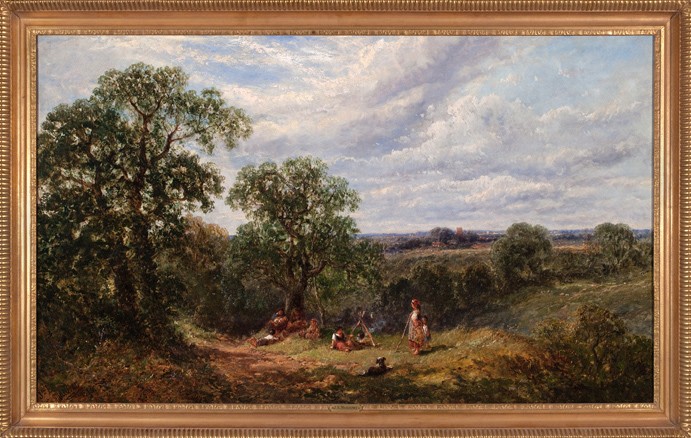James Edward Meadows was born in Mountnessing in Essex. (He is often listed as James Edwin but official documents confirm James Edward.) He was the son of marine painter James Meadows, Sr. (1798-1864). The second of five sons, he was not the only artist. His brother Edwin Lewis was also a landscape artist, Alfred John was an artist, actor and scene painter, William was a sculptor and painter and Arthur Joseph (1843-1907) was an artist who specialized in Venetian and Mediterranean subjects. James Edward is known as a landscape and marine painter.
When he was younger he lived in Essex, Stepney, Clapham but following his marriage to widowed single-mother Eliza Rackliffe, he moved with his family to Kennington on London’s South Bank. Over the next decade the family moved often but generally stayed in the area that is West London today. They did reside for a period in 1857 in Chadwell, Ilford where the Essex and London borders meet. Around 1874 the family moved to the imposing Gainsborough house in West London where they lived until James Edward died.
Although he lived and worked in London Meadows is known for his rustic landscapes. He was particularly known for working along the Southern coast. He exhibited at the Royal Academy in London from 1854 to 1872 (26 works), as well as at the British Institution (17 works) and the Society of British Artists, Suffolk Street (55 works). He also showed at least seven paintings at the Royal Society of Artists in Birmingham, two at the Walker Art Gallery in Liverpool, three at the Manchester City Art Gallery.
Like others in his family he also painted at least one theatre set. Theatre diarist E. L. Blanchard wrote about the opening of the Charing Cross theatre in June 1869: “The act- drop, representing the Mall in St James's Park in Charles II's time was painted by J.E Meadows."
In 1881, the census records indicated that he was a professor of painting. His technical skill garnered him two important commissions. Using postcards, maps, plans, photographs, drawings and engravings he painted compositions of the new cities of Sandhurst and Ballarat in Victoria, Australia, where he had never been. The works were part of the Victorian Pavilion of the Colonial and Indian Exhibition held in 1886 in South Kensington in London.

